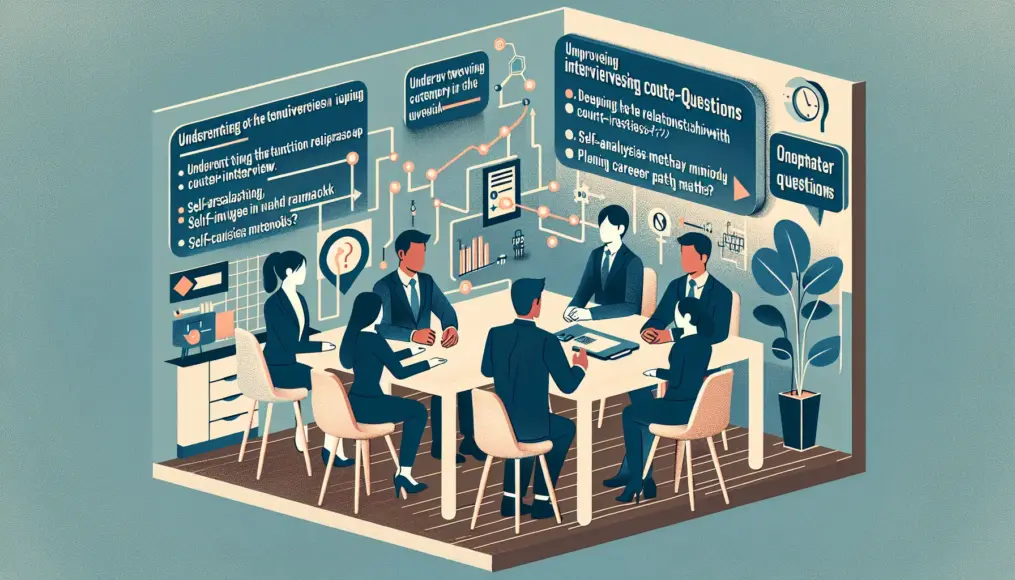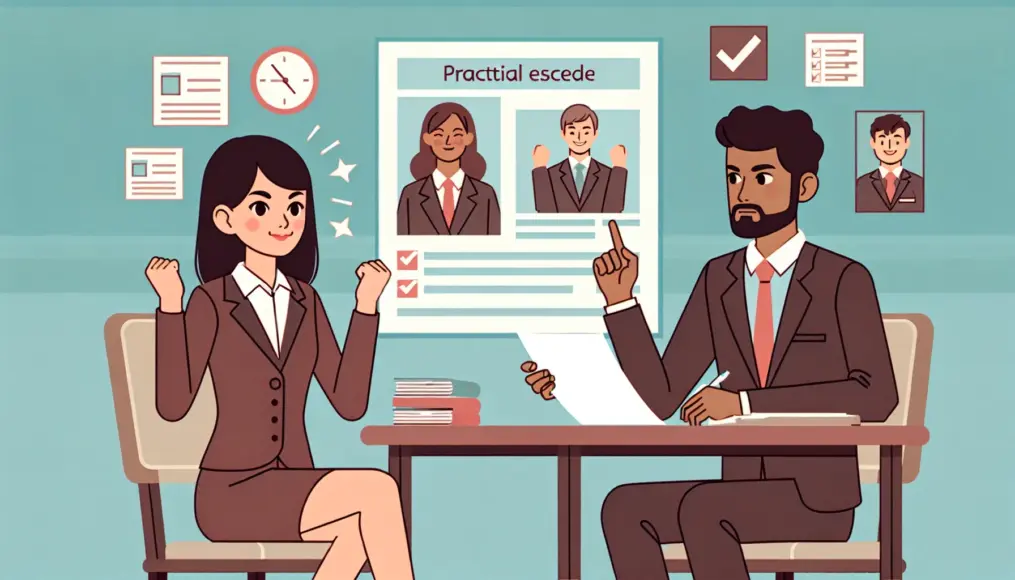When it comes to interviews, asking reverse questions holds more significance than you might think. The way you engage after posing these questions can significantly impact how you’re perceived and even shape your career trajectory. Did you know that you can leverage this opportunity to strengthen your rapport with the interviewer and leave a more favorable impression?
In this article, we’ll explore how to effectively utilize the information and feedback gained through reverse questions, as well as highlight the importance of self-analysis for personal growth. Let’s delve into how reverse questions can play a crucial role in your post-interview reflections and career planning.
- The Impact of Reverse Questions and the Importance of Communication
- Techniques for Leaving a Positive Impression and Utilizing Feedback
- Gaining Self-Understanding and Clarifying Your Career Plan Through Reverse Questions
Understanding the Purpose of Reverse Questions
Reverse questions are a crucial part of the interview process, and when used effectively, they can significantly change the impression you leave. Not only do these questions allow you to showcase your enthusiasm and interest, but they also foster deeper communication with your interviewer. By asking these questions, you demonstrate your engagement, paving the way for a stronger connection.
In this section, we’ll explore the specific benefits of reverse questions and the importance of communication through them. Let’s discover how to leverage reverse questions for a successful interview experience.
Benefits of Reverse Questions
The advantages of asking reverse questions are numerous. First and foremost, they serve as an effective means of self-promotion. By expressing your thoughts and interests, you can differentiate yourself from other candidates. Additionally, these questions help you understand the interviewer’s perspectives and values, which can be invaluable for building future relationships.
Moreover, the information you gain from reverse questions is crucial for shaping your own career plans. Knowing what values the interviewer is seeking allows you to clarify your own direction. Thus, reverse questions are not just inquiries; they’re an essential element of your personal growth.
- Reverse questions serve as a tool for self-promotion
- They enhance communication with the interviewer
- The insights gained can inform your career plans
Communication Through Reverse Questions
Reverse questions are an important tool for facilitating smooth dialogue with your interviewer. Through these inquiries, you can learn about their thoughts and the company culture, allowing for a stronger relationship to develop. This two-way communication presents a significant opportunity to leave a lasting impression of your unique personality.
Additionally, asking reverse questions often makes interviewers more open and approachable. When both parties engage in questioning, a relaxed atmosphere can emerge, leading to more natural conversations. Such experiences can greatly influence the outcome of your interview.
Understanding the importance of reverse questions is just the beginning; knowing specific techniques to enhance their effectiveness is key. If you’re intrigued by this topic, I recommend checking out Tips for Reverse Questions in Second Interviews. This resource will help you effectively utilize reverse questions and further improve your impression during interviews.
- Reverse questions facilitate smooth dialogue
- Understanding the interviewer’s thoughts fosters better relationships
- They deepen mutual communication
Building a Stronger Connection with Interviewers
During job interviews, asking thoughtful questions is a crucial way to deepen your relationship with the interviewer. To leave a positive impression, it’s not enough to simply ask questions; how you frame those questions and leverage the feedback you receive can significantly influence how you’re perceived. By understanding how to effectively navigate the conversation through these questions, you can boost your chances of interview success.
In this section, we’ll explore techniques for making a lasting impression through thoughtful questioning, as well as how to use feedback after the interview to your advantage. By focusing on these key points, you can cultivate a better rapport with your interviewer.
Techniques for Making a Lasting Impression
To leave a great impression through your questions, it’s essential to truly listen to what the interviewer says. Understanding what they value and asking related questions demonstrates your genuine interest. Moreover, posing specific questions conveys your seriousness and commitment to the conversation.
Additionally, asking questions isn’t just about gathering information; it’s also an opportunity to find common ground with the interviewer. Identifying shared interests or values can help foster a more approachable relationship. This kind of connection often serves as the key to making a positive impact on the interviewer.
- Listening attentively is crucial
- Asking specific questions shows your seriousness
- Finding common ground helps build rapport
Utilizing Feedback
After you’ve asked your questions, it’s important to thoughtfully consider any feedback from the interviewer. This feedback can provide valuable insights into your strengths and areas for improvement. Understanding what the interviewer appreciates or any lingering questions they may have can inform your approach for future interviews.
Additionally, expressing gratitude after the interview is another way to leverage feedback. When sending a thank-you email, referencing their responses to your questions can further enhance your impression. By actively engaging with the feedback you receive, you can strengthen your relationship with the interviewer.
If you’re interested in deepening your connection with interviewers through thoughtful questions, check out this article: “Secrets to Succeeding with Reverse Questions in Early Selection! Ways to Leave a Good Impression on Companies.” It provides specific methods and preparation tips for using reverse questions effectively, offering valuable insights for your interview success.
- Use feedback as a valuable source of information
- It’s important to express gratitude after the interview
- Send a thank-you note that reflects on their responses to your questions
Growth Through Self-Analysis
Asking reverse questions during an interview is a fantastic opportunity to deepen your self-understanding. By posing questions to the interviewer, you can reaffirm your values and thoughts about your career. The insights gained from these reverse questions extend beyond just the interview results; they can significantly contribute to your personal growth moving forward. In this section, we’ll explore the importance of self-understanding through reverse questioning and how reflecting after an interview can lead to growth.
Reflecting after an interview is an essential part of the self-analysis process. By reviewing the interviewer’s responses and feedback to your reverse questions, you can clarify your strengths and areas for improvement. This clarity will help you make better decisions in future interviews and career choices.
Deepening Self-Understanding Through Reverse Questions
Engaging in reverse questioning can enhance your self-awareness. As you contemplate what questions to ask the interviewer, you’ll find opportunities to think about what interests you and what values you seek. This self-analysis is crucial for determining the direction you want to take in your career.
Moreover, the answers you receive from the interviewer can help you organize your thoughts. This process aids in understanding your strengths and weaknesses, allowing you to create a concrete action plan for future growth.
- Reaffirm your values through reverse questioning
- Progress your self-analysis through the interviewer’s responses
- Gain clarity on your strengths and areas for improvement
The Importance of Post-Interview Reflection
Reflecting after an interview is a vital step in fostering self-growth. By revisiting the feedback and reactions you received after asking reverse questions, you can assess what aspects were appreciated and where there might be room for improvement. This reflection can lead to valuable insights that contribute to your personal development.
Furthermore, leveraging the insights gained from reflection in your future interviews and career plans allows you to present yourself more effectively. Being aware of your growth while moving to the next step can be the key to unlocking your path to success.
- Promote self-growth through post-interview reflection
- Identify specific areas for improvement through feedback
- Gain insights that can be applied to future interviews and career paths
Leveraging Reverse Questions for Your Career Plan
Reverse questions are crucial not just in interviews but also when it comes to shaping your career path. The insights gained from these questions can help clarify the direction of your career. In this section, we’ll explore how to utilize reverse questions to build a solid career plan. By drawing on valuable advice and opinions from interviewers, you can sharpen your future goals.
Moreover, effectively using the information obtained through reverse questions allows you to create a more concrete career plan. Let’s discuss how to harness these questions while keeping your aspirations and desired direction in mind.
Clarifying Your Career Direction
By asking reverse questions, you can gain a better understanding of the industry and company needs through the interviewer’s responses. This insight helps you determine the skills and experiences you should focus on developing. Knowing what kind of talent interviewers are looking for allows you to refine your career direction more clearly.
Additionally, the information you gather through reverse questions can aid in self-analysis. By identifying a career path that aligns with your strengths and interests, you can build a more fulfilling professional life. Reverse questions transcend mere information gathering; they become an essential tool for contemplating your future career.
- Understand industry needs through interviewers’ responses
- Gain clarity on the skills and experiences you should pursue
- Discover a career path that suits you through self-analysis
Utilizing Insights from Reverse Questions
The information obtained through reverse questions is incredibly valuable for your career plan. Based on feedback and advice from interviewers, you can clarify the path you should take. With specific insights, you can consider what skills to hone and what experiences to seek out.
To make the most of this information, it’s essential to establish a concrete action plan. By setting goals based on the knowledge gained from reverse questions and taking a strategic approach to reach those goals, you can foster your career growth. Leveraging reverse questions can lead to a more enriching career journey.
- Clarify your path based on feedback
- Gain concrete insights on which skills to focus on
- Promote career growth by creating an action plan
Summary
Asking reverse questions during an interview is a crucial way to deepen your self-understanding and build a relationship with the interviewer. The insights gained from these questions can significantly enhance your career planning. By carefully considering the feedback and reactions from the interviewer, you can identify your strengths and areas for improvement, providing you with a roadmap for your next steps.
Moreover, engaging in reverse questioning helps you clarify the value you bring and the direction you should take in your career. This establishes a strong foundation for a fulfilling professional life. Make the most of the interview setting to foster your personal growth.
- Reverse questions play a vital role in self-understanding and relationship building.
- Feedback from the interviewer can lead to your next steps.
- You can clarify your career direction through reverse questioning.
The knowledge and experience gained from interviews can be invaluable for your growth. We encourage you to use this article as a guide and make the most of reverse questions. We look forward to hearing your comments and thoughts!



Comment